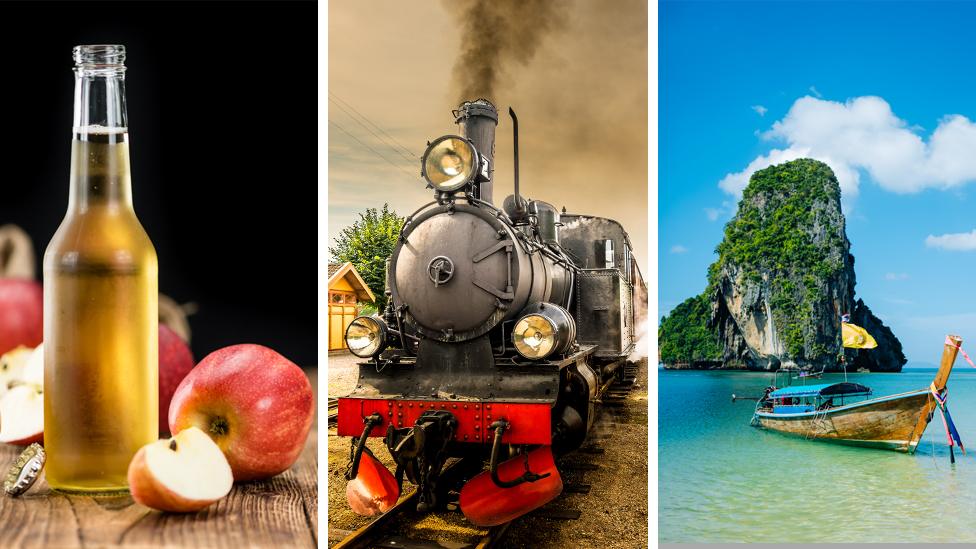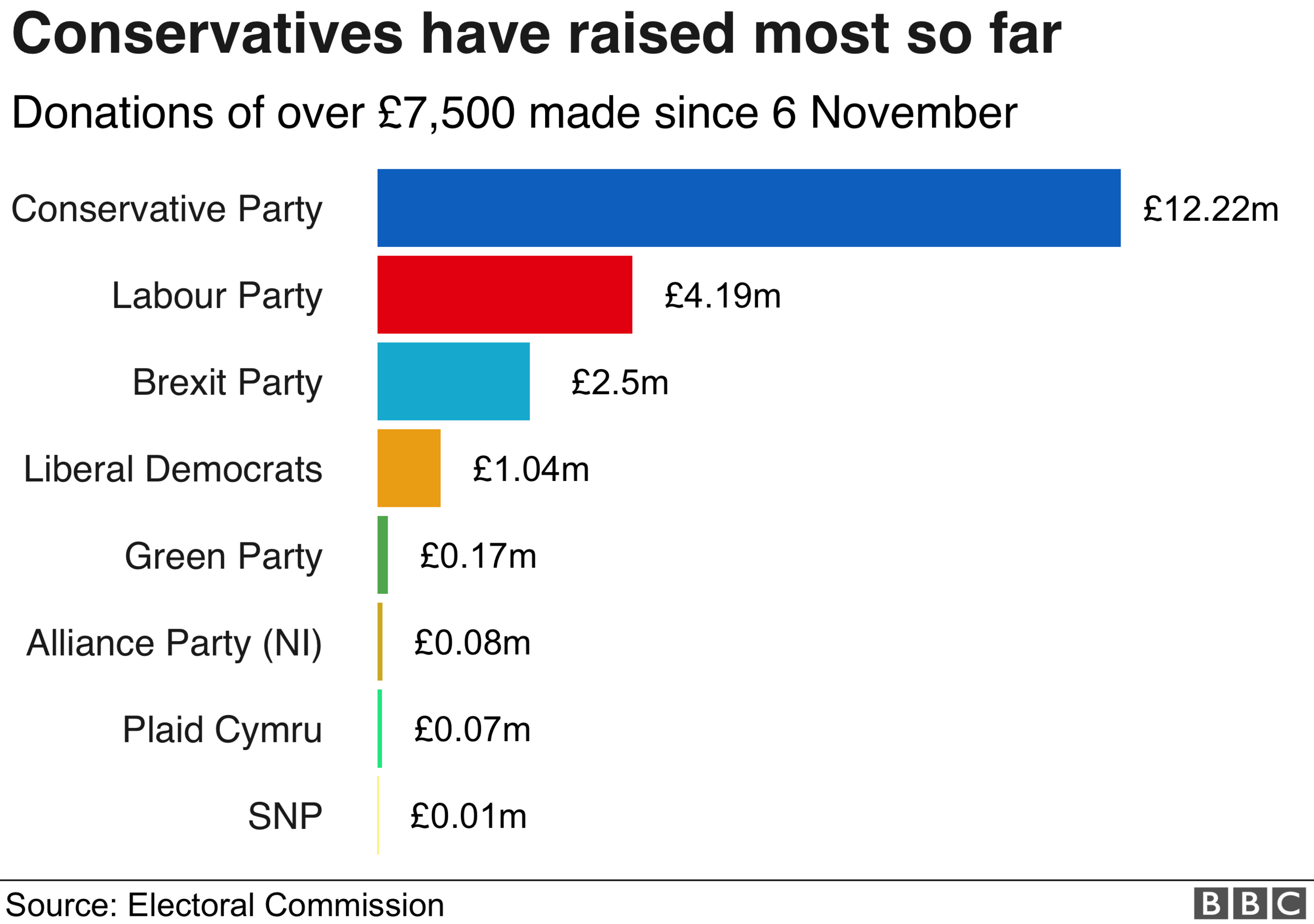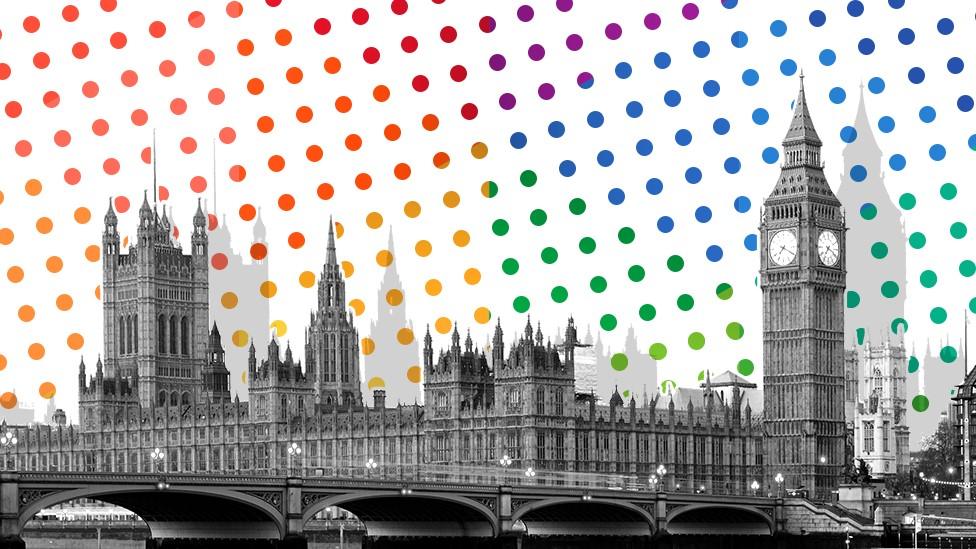General election 2019: Who is paying for the election?
- Published

Cider, steam locomotives and Thailand: some of the more unusual things that unite major party donors
Russian oligarchs. A fashion magnate turned cider maker. A theatre impresario. An online gambling entrepreneur. The wife of a Syrian-born arms trade fixer.
These are some of the big donors pouring hundreds of thousands (or even millions) of pounds into the political parties, and they are an intriguing bunch. Their largesse pays for the increasingly important online messaging, the battle buses, the rallies, stunts and all the paraphernalia of a 21st Century election campaign.
All the parties hoover up smaller donations from supporters of more modest means, but these big donations from the mega-wealthy can transform the parties' striking power.
Why do they do it? Some reach into their wallets out of genuine support and conviction. But others may do it hoping for influence and access, and there's genuine concern around public policy being shaped behind the scenes by special interests which can splash the cash.
Donations of more than £7,500 have to be registered with the watchdog body, the Electoral Commission. There were £20.3 million of these large donations in the first three weeks of the campaign, and the Conservatives reaped the biggest share.

Here's a look at some of the biggest sums and some of the most interesting names to crop up in the Electoral Commission's list.
Conservatives

Bahamas-based theatre impresario, John E Gore, who made his money from blockbuster musicals, including Wicked and Hamilton. He says he's donating to the Conservatives as a British citizen concerned about the rise of extremism. His donation during the election adds to the £1.8m he's given over the previous two years.
A co-founder of Hargeaves Lansdown, one of the UK's largest financial services companies, Peter Hargreaves is estimated to be worth £3.3bn. He was a major supporter of the Leave.EU campaign during the EU referendum, donating £3.2m. He predicted the Brexit vote would be "the biggest stimulus to get our butts in gear that we have ever had….It will be like Dunkirk again."
Notable others:
Lubov Chernukhin, £200,000: The wife of Vladimir Chernukhin, a former Russian deputy finance minister who became chairman of a state-owned bank. After a falling-out with President Vladimir Putin, he was dismissed, and the couple moved to Britain. Lubov is now a British citizen and she has donated more than £450,000 to the Conservatives in the past year. She once successfully bid £160,000 at a Tory fundraiser to play tennis with David Cameron and Boris Johnson, and £30,000 to have dinner with Defence Secretary Gavin Williamson in the Churchill War Rooms, in Whitehall. Asked about the match some years later, in the wake of the Salisbury poisoning, Mr Johnson defended it, warning against creating a "miasma of suspicion" against all Russians.
Ann Rosemary Said, £200,000: The wife of Wafic Said, a Syrian-born billionaire arms deal fixer who helped broker Britain's biggest arms sale - the controversial al-Yamamah deal with Saudi Arabia - signed by Margaret Thatcher in 1985. Mrs Said also donated £10,000 to Boris Johnson's leadership campaign. Before 2000, Mr Said had himself donated to the Conservative Party, but this was before the law was changed so that only people on the UK electoral register were allowed to give to political parties.
Lakshmi and Usha Mittal, £75,000 each: Once the third richest man in the world, Lakshmi is married to Usha Mittal. He is the chairman and CEO of ArcelorMittal, the world's largest steelmaking company, owning 38% of its shares. He is also a member of the board of directors of Goldman Sachs and owns 11% of Queens Park Rangers football club. Mr Mittal gave £10,000 to Boris Johnson's Conservative leadership campaign. He had previously given £125,000 to Labour, when the party was in government under Tony Blair.
Aquind Ltd, £50,000: Led by Ukrainian-born British businessman Alexander Temerko, Aquind is a company proposing to build a cross-Channel electricity interconnector to bring energy generated in the EU to Britain. Mr Temerko was an official in the Russian Defence Ministry in the 1990s and later a senior executive and director at the Russian oil and gas company, Yukos. He became a UK citizen in 2011 and is a major Conservative donor, having given more than £1.3m to the party. In November 2019, he called for the Intelligence Committee report on Russian interference in British politics, to be published.
Labour

The biggest single donation of the election, cementing Unite's position as Labour's banker - they gave Labour £3.5m for the 2015 election and £4.4m in the months up to the vote in 2017. The union's general secretary, Len McCluskey, is a staunch supporter of Jeremy Corbyn and has played a key role in preventing Labour from swinging behind a second referendum or a Remain position.
Unite has also made a number of smaller donations, in the tens of thousands, which have come from the regions and possibly from individual fundraising initiatives. The more Corbyn-sceptic union, the GMB, gave £250,000 (it gave £1m in 2015, when Ed Miliband was Labour leader),
Notable others:
Ecotricity, £35,000: The green electricity company led by former New Age traveller turned eco-entrepreneur, Dale Vince.
Harold Immanuel, £10,000: A long-standing Labour member, who stood against Labour in the Brent East by-election of 2003 in protest at the Labour government's Iraq policy and against "creeping privatisation" in the NHS.
Brexit Party

Previously a Conservative donor, Christopher Harborne is a little-known figure even in Brexiteer circles, keeping a much lower public profile than previous backers of Nigel Farage, like the insurance tycoon Arron Banks. He gave three separate donations of £1m each to the Brexit Party earlier this year, and also gifted a coffee machine to their HQ.
His donation for the election campaign, which amounts to more than 90% of the Brexit Party's total funding, would have given them the financial firepower to compete with the established parties, had they decided to campaign in Conservative seats. It looks likely that the Brexit Party will end this campaign with much of the money unspent, providing a war-chest for future operations.
Two of Mr Harborne's businesses - AML Global and Sherriff Group - are linked to private aircraft and aviation. Mr Harborne has British nationality, but lives most of the time in Thailand.
Notable others:
Jeremy Hosking, £250,000: Another former Conservative donor who became a major Brexit backer, he gave £1.7m to the Vote Leave campaign during the 2016 referendum. He is the main financial force behind the new political-cultural magazine The Critic. He is also Britain's biggest owner of vintage steam engines and is a shareholder of Crystal Palace FC.
Lib Dems

Owns 31.2% of Gamesys, the company that runs the "soft gaming" website Jackpotjoy.com, which specialises in bingo, instant-win games and casino tables. In 2009/10, the company made £21m profit. Noel Hayden has a stake worth £60m.
Notable others:
Davide Serra, £60,000: The Italian-born founder and CEO of Algebris Investments, a global asset management company that manages $11.3bn of assets. Strongly anti-Brexit, he argues it was "mis-sold" to the general public and will leave the younger population "screwed". He describes himself as "a good Catholic boy" who voted Labour in 2017.
Green Party

Founder of the fashion chain Superdry, and a maker of organic cider. Julian Dunkerton donated £1m to the People's Vote campaign for a second EU referendum in 2018. He has also donated £35,000 to Plaid Cymru and £30,000 to the Liberal Democrats.

Photograph of Noel Hayden © @Pix.Pictour.org
- Published11 December 2019

- Published6 December 2019
